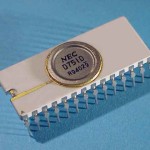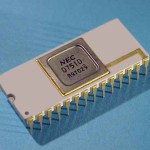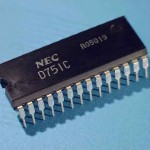General
|
General Information |
The NEC uPD751 (also known as the uCom-4) is the 1st Japanese one chip microprocessor.In early 1971, SHARP requested NEC to manufacture a very small computer for them, by this request they were requesting NEC to create a microprocessor.Nippon Coca-Cola was the “prime-mover” in the sequence of events. Nippon Coca-Cola decided to use handheld POS (Point of Sale) terminals to increase efficiency at delivery sales points. They selected SHARP to make these handheld POS terminals, and SHARP in turn selected NEC to create these LSI chips for these POS terminals.
By December 1971, NEC made a 2 chip 4bit CPU, uPD707 and uPD708. These NEC chips were used in handheld POS terminals. The codename for the Sharp POS device as “BillPet”. The project was completed and in production by March 1972. In the mean time, NEC LSI designers team had heard the news of the Intel 4004. Taking the design of the 707 and 708, they decided to make a one chip microcomputer, this became the uPD751, uCOM-4. The uPD751 ran at a clock speed was 1.0MHz (Single phase) and 2500 transistors, N-Channel MOS process. (Historical accounts from NHK “Denshi-Rikkoku Nippon no Jijo-den, Vol. 4” i.e. “Biography of Japan as Electric Imperium Vol. 4”, Translated by Naoto Kojima ) |
|
Production |
Early 1973 |
| Designers | NEC LSI design team (5 men): Sohichi Suzuki |
Architecture
| Type | Data Word | Address Space | Clock | Instruct- ions | Assists | Reg’s GP | Reg’s Math | Reg’s Index | IO Ports | Stack | Interrupts | Memory |
| NMOS, CPU | 4-bit | 4Kb | 1.0MHz | 55 | BCD | 1 In, 1 Out | 4 | NA | NA |
Packages
Related Chips
|
Related Chips |
uPD707+uPD708 (2 chip version of the uCOM-4, made for OEM only) |
|
Second Sources |
None |
| Support Chips | uPD752C/D (4bit I/O Ports) uPD412D (256Word * 4bit Static RAM) uPD463D (256Word * 8bit Mask ROM) |



